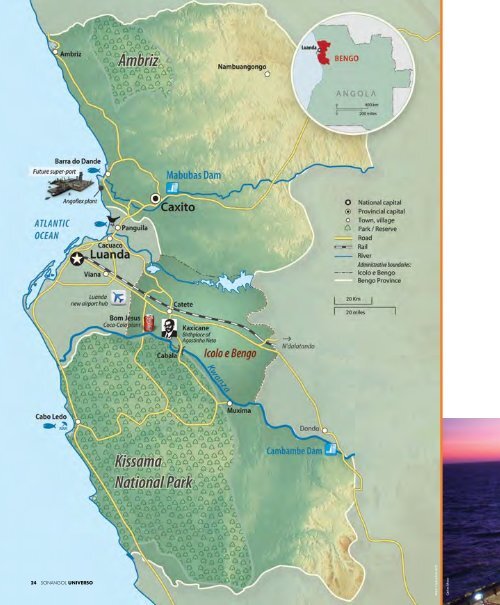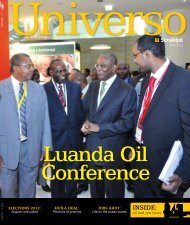PDF Format - Sonangol Limited - Oil Trading Services
PDF Format - Sonangol Limited - Oil Trading Services
PDF Format - Sonangol Limited - Oil Trading Services
Create successful ePaper yourself
Turn your PDF publications into a flip-book with our unique Google optimized e-Paper software.
24 SONANGOL UNIVERSO<br />
Mark Clydesdale BZO<br />
Carlos Moco<br />
Angola’s leading exports. To promote its<br />
bananas, Caxito held its first Banana Fair<br />
in February. Exhibitors from the provinces<br />
of Kwanza Norte, Bengo, Benguela, Zaire,<br />
Uíge, Kwanza Sul, Malange and Luanda<br />
attended the event.<br />
Abrahão Pio dos Santos Gourgel,<br />
Angola’s Minister of Economy, said the<br />
country might start exporting bananas<br />
within the next two years, judging by<br />
the growth recorded of this product.<br />
Conditions, he said, had been created to<br />
ensure a continued increase of quality<br />
through planting systems and improved<br />
technical assistance.<br />
Agrolider, the Angolan agribusiness<br />
giant and Caxito Banana Fair prizewinner,<br />
forecasts it will produce 100,000 tonnes of<br />
the fruit in the 2012-13 growing season,<br />
compared with 54,000 tonnes in the<br />
previous harvest.<br />
Part of Agrolider’s crop comes from<br />
the 2,500-hectare Caxito Rega irrigated<br />
farming area, located in a former sugar<br />
plantation near provincial capital Caxito.<br />
Caxito Rega a government-managed<br />
initiative with 70 per cent state ownership<br />
was established in 2008.<br />
An existing irrigation system including<br />
23km of channels was renovated. Some<br />
1,600 hectares of Caxito Rega are cultivated<br />
by private companies and the rest by<br />
family farmers and individuals.<br />
A major step was taken to process<br />
produce at the site in August 2012 when<br />
a factory was opened, initially to process<br />
and pack dried bananas and tomato<br />
paste and pulp. Financed by Germany’s<br />
Deutsche Bank and installed by Spain’s<br />
Incatema Consulting, the plant has the<br />
capacity to process 2.5 tonnes of tomatoes<br />
and 750kg of dried bananas an hour. The<br />
165 staff operators were trained in Spain<br />
and Angola.<br />
The crucial role played by process<br />
plants such as these is that they absorb<br />
excess produce, especially from small<br />
farmers. This gives them an incentive to<br />
grow greater volumes and gain a more<br />
secure income, and also reduces wastage.<br />
A key component of the project was the<br />
arrival of electricity from the renovation of<br />
the Mabubas Dam in June 2012. The dam<br />
now has 25.6MW capacity compared to<br />
17.8MW two decades ago just before it<br />
stopped operating. Mabubas is initially<br />
also supplying Luanda and Caxito but will<br />
later extend power deliveries to the rest<br />
of Bengo. Until now the region had been<br />
using expensive diesel generators to make<br />
up for the energy shortage.<br />
The fertility of Bengo’s soils is<br />
impressive. Agrolider’s 350-hectare<br />
farming operations in Caxito also produce<br />
papaya, melons, water melons and<br />
eggplants. The company plans to grow<br />
dessert grapes, mangoes, oranges and<br />
tangerines at the site. Agrolider has another<br />
145-hectare plantation at Bom Jesus where<br />
it produces bananas, mangoes and grapes.<br />
Bengo’s attractiveness as a place to<br />
produce and process fruit has not been<br />
Angoflex spoolbase, Barra do Dande<br />
lost on foreign companies. Ghana’s<br />
ambassador visited the province recently<br />
and said Ghanaian company Blue<br />
Skies planned to produce mango and<br />
pineapple concentrate for its juice brand.<br />
The ambassador added that a Ghanaian<br />
company was also considering setting up<br />
a tyre plant in Bengo.<br />
Coca-Cola has recently built a $36<br />
million bottling plant at Bom Jesus<br />
alongside the Kwanza River. The factory<br />
not only has access to water but is well<br />
placed for accessing Angola’s main<br />
highways for its product distribution.<br />
Tourism expansion<br />
PROVINCE<br />
Another money-spinner shared by Bengo,<br />
Icolo e Bengo, and especially Kissama, is<br />
tourism. These areas can be reached easily<br />
by new highways heading south and east<br />
from the capital.<br />
Kissama is home to Angola’s bestknown<br />
and most accessible wildlife<br />
park, while Icolo e Bengo contains the<br />
historic birthplace of Agostinho Neto, the<br />
country’s first president, at Kaxicane near<br />
Catete, and the national Christian shrine<br />
of Muxima. Both sites are picturesquely<br />
located alongside a wide section of the<br />
slow-moving Kwanza River.<br />
Also on the river the church of Our<br />
Lady of Muxima, reputedly a site of<br />
miracles, dates from the 16th century and<br />
is the object of pilgrimages, especially in<br />
September, when the faithful camp around<br />
the shrine.<br />
Muxima township is also overlooked<br />
by an imposing Portuguese colonial fort<br />
which affords dramatic views over the<br />
rich lands along the banks of the Kwanza.<br />
The fort was the scene of fighting between<br />
Dutch and Portuguese troops in the 17th<br />
century when the two maritime powers<br />
fought each other around the globe, from<br />
Brazil to the Far East.<br />
Access to Muxima was recently<br />
enhanced by the building of a new<br />
highway which includes Angola’s longest<br />
bridge at Cabala. Better communications<br />
from Luanda and the rest of the country<br />
to Muxima facilitated the arrival of an<br />
estimated 500,000 people to the shrine this<br />
year. The Bishop of Viana compared the<br />
DECEMBER 2012 25








